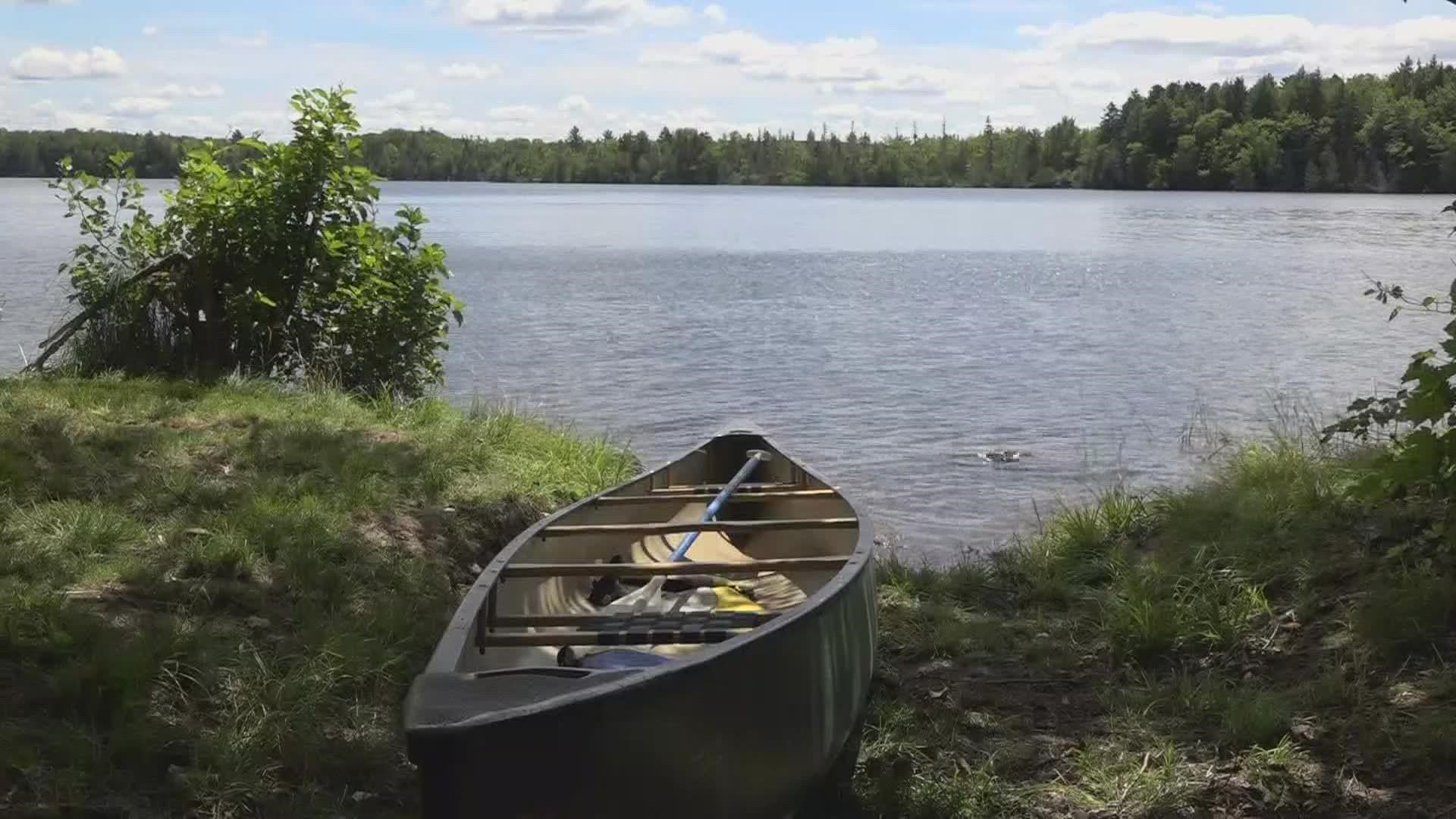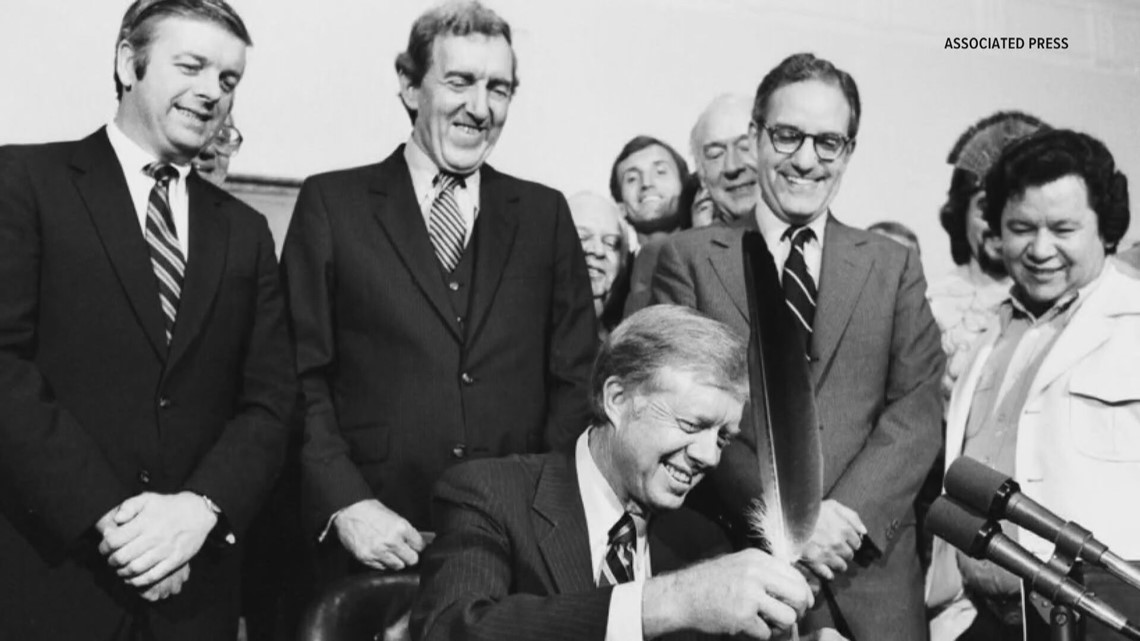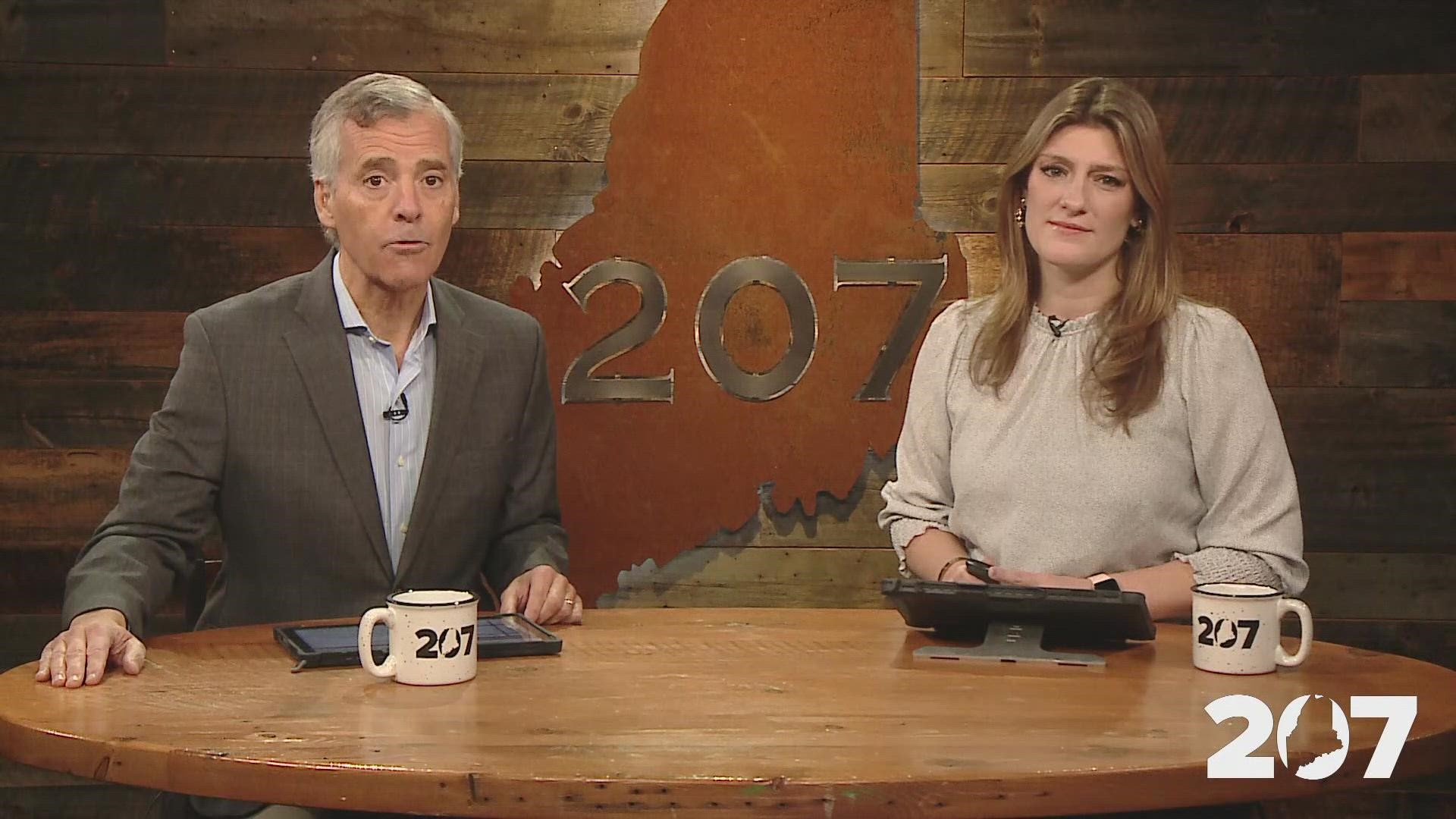The Maine Indian Claims Settlement Act, more than 40 years later
The act was signed by President Jimmy Carter in 1980 and came after a long legal battle between the State of Maine and the Passamaquoddy’s and Penobscot Nation.

The land that is Maine was tribal land long before white settlers arrived.
It first was stewarded by four Indigenous tribes: the Passamaquoddy, Penobscot, Maliseet and Micmac tribes.
Together, they fall under the umbrella of Wabanaki Nation.
More than 40 years ago, the Maine Indian Land Claims Settlement Act was signed into law, but the conversations surrounding the Wabanaki Nation and its future are far from over.
The Maine Indian Claims Settlement Act What is it?
The Maine Indian Claims Settlement Act was signed Oct. 10, 1980, by President Jimmy Carter.
The settlement came after a long legal battle between the State of Maine and two of the Wabanaki nation's tribes: the Passamaquoddy and Penobscot.
At the time, the tribes claimed 12 million acres, or nearly two-thirds of the state of Maine, belonged to them. Justice Edward Gignoux, agreed with them.
The Maine Indian Claims Settlement Act Who did it impact?
That ruling, by Justice Gignoux, stirred controversy across Maine. All of a sudden everyone from private landowners to business owners were worried about the future.
At the time, one newspaper headline from the Bangor Daily News read, "Indians warn of lawsuits against homeowners." Another read, "Land claims cloud proposed center."
The ruling also forced the State of Maine and tribes to work together and reach a settlement agreement to be approved by Congress.
Maine's governor and the legislature viewed the outcome as a huge win.
At the time, the Passamaquoddy and Penobscot Nation saw it as a victory as well.
The Maine Indian Claims Settlement Act Congress gets involved
Two key players in the passage of the legislation were U.S. Sens. Bill Cohen and George Mitchell. Attorney Tim Woodcock, who was from Bangor, was appointed by Cohen to the Indian Affairs Committee.
It would take several months, but eventually all parties would come to an agreement.
The agreement, approved by Congress, gave the tribes $81.5 million in reparations for land taken from them.


The Maine Indian Claims Settlement Act Maine implements the act
A sister law passed by the Maine legislature, the Maine Implementing Act, would determine how those assets would be distributed to the tribes and would also require them to follow Maine law.
The Maine Indian Claims Settlement Act What is sovereignty?
Donna Loring, Darren Ranco, and Maria Giourard are all members of the Penobscot Nation. The trio has spent hours combing through the settlement and its history over the years.
Giourard grew up on Indian Island and wrote her senior thesis on the act at the University of Maine.
Ranco is an associate professor of anthropology and coordinator of Native American research at the University of Maine.
Donna Loring served as senior advisor on tribal affairs under Gov. Janet Mills.
They believe that, for the Wabanaki people, the act had the unintended and unwanted effect of taking away the tribe's sovereignty.
Sovereignty is defined as having supreme power or authority as a self-governing state.
And while the act was written in a way that allowed the tribes to go back and make amendments as needed, they said that process didn't work as they expected.
For that reason, among others, Loring called the Maine Indian Claims Settlement Act the "biggest piece of fraud in Maine's history and maybe even the country's history."
"At that time, it was a big deal for our tribal communities. And as it turns out, the written words didn’t accurately capture the spirit and intent of the agreement, in my opinion," Giourard said. "There was a lot of hope that this was a beginning of a new relationship that we were going to be working, government to government, or as equals, and it doesn’t seem like that came to pass."
"I think people had been promised, maybe incorrectly, that even if things were a little bit off that it was fixable, that it could be the first draft or something," Ranco said.
"Their vision was always to assimilate the tribes and have the tribal communities become municipalities, you know, political subdivisions of the state, which is how they're interpreting the document now, and they're referring to us over and over again as municipalities," Loring said.
The Maine Indian Claims Settlement Act Follow the money
Records indicate tribes in Maine had been living in extreme poverty at the time of the agreement.
In 1976, after receiving Federal recognition, some money started to flow into the tribes. This gave them a little more control over their economic future. Girouard said it was a transformative time for Indian Island.
"The first phase of housing was being developed, and it was something so beyond our scope we nicknamed it Hollywood," Giourard said. "These new phases of housing that we're coming in were really nice by our standards, and we could see how our community was growing and having opportunities and just building up it was just before our eyes."
The 1980 Settlement Act signaled another potential shift in economic development for the tribes.
Girourard, Loring, and Ranco agreed there were good and bad investments made with the money they received from the settlement.
One of those deals, specifically made by the Passamaquoddy tribe, included the purchase of the Dragon Products Company in Thomaston, New England's only cement maker.
The tribe sold it to a Massachusetts-based company a few years later.
"The deal, which sources valued at $80 million, is an example of the increasingly aggressive business posture of American Indian tribes," the New York Times said in an article.
An investment the Penobscots had high hopes for was the Sockalexis Ice Arena, which was built on Indian Island in 1984.
"We had a lot of children who were playing ice hockey, and we thought this was a great way to invite people over, and it didn't pan out that way, you know. The arena still stands, and it's been through a couple of different life spans," Giourard said. "It was the high-stakes bingo, and then that became challenged with the casinos in Bangor, and I would say some of the inequitable gaming laws of the state, so I would say there were a lot of factors. And, like Donna said, we didn't know a whole heck of a lot about being business owners in the beginning but, you know, we did the best we could, and everything is a lesson learned."
The Maine Indian Claims Settlement Act Back to the drawing board?
The question surrounding sovereignty and the future of the tribes remains unresolved.
In fact, some would like to see the act scrapped completely and instead have members of Wabanaki Nation and Maine officials go back to the drawing board.
"I believe that the Maine Settlement Act has locked us again into this paternalistic relationship with the state of Maine, a relationship that we don't want, we haven't wanted for a long time," Giourard said. "It didn't serve us well, you know, all the years leading up to the land claims, and so there's nothing that can convince me that anyone expected that to continue, and it's almost like the land claims kept us in shackles."
The Maine Indian Claims Settlement Act Holding onto hope
Despite the continued controversy surrounding the act, everyone interviewed for this story agreed there was hope for the future.
"We just want to be left alone to progress and be able to choose our economic future to choose our educational future to do what we see fit to do with our lands and our court and our law enforcement." Loring said.
"Some people fear that if the tribes to get sovereignty, you know, it's going to be horrible. [That] they're just going to be able to do anything and trample their next-door neighbor's rights. I know that's not the way I see the tribes operating," Loring added. "I think that we would totally be respective, and we are of other people's lands and how they do things, you know, because we've had it done to us. It doesn't mean we're not going to turn around and do something like that to them, which they fear."
The Maine Indian Claims Settlement Act A statement from Gov. Janet Mills
When asked for comment on the Settlement Act and the question of sovereignty, NEWS CENTER Maine received this statement from Gov. Janet Mills:
“When I became Governor in January 2019, I pledged to pursue a new era of Tribal-State relations for the State of Maine and the Wabanaki Nations - one defined by collaboration, not litigation; by trust, not animosity.
Since then, the Wabanaki people, the Legislature, and my Administration have worked together to make significant strides, including:
- negotiating and signing into law legislation to amend the Settlement Act to expand the Penobscot and Passamaquoddy's authority to prosecute domestic violence against non¬Tribal members in Tribal courts;
- writing and signing into law legislation that implements the nation's strictest water quality standards to protect sustenance fishing in culturally important Tribal waters;
- writing and signing into law legislation that transfers ownership of culturally significant land in Meddybemps from State ownership to the Passamaquoddy Tribe;
- granting a full posthumous pardon, believed to be the first in Maine history, to Don Gellers, who was a former attorney and advocate for the Passamaquoddy Tribe;
- calling for and signing into law a ban on the use of Native American mascots, which are both offensive and culturally insensitive to the Wabanaki peoples, in Maine schools - the first state in the nation to do so;
- signing into law legislation that replaces Columbus Day with Indigenous Peoples' Day in Maine;
- signing into law legislation establishing a Permanent Commission on the Status of Racial, Indigenous and Maine Tribal Populations to promote, implement and coordinate programs that create and improve opportunities for historically disadvantaged racial, indigenous and Tribal populations in Maine - and dedicating $50,000 from the Governor's Contingent Account to begin its work;
- signing into law a bill that creates a process to review all legislation for potential impacts on historically disadvantaged populations; and
- appointing Tribal members to Boards and Commissions such as the Maine Criminal Justice Academy and the University of Maine Board of Trustees to enhance Tribal representation.
I think we would all agree that none of these achievements were obvious or easy, but they are the result of communication and collaboration. I am proud of these measures, as I believe you are but most importantly, I believe they are just the beginning of progress. I strongly believe there is room to continue working together for the benefit of the Wabanaki people and the people of Maine.
For example, LD 906 and LD 585 are two of the latest examples of the progress we can make when we work together respectfully and deliberately.
LD 585 was the result of a months-long negotiation between the Wabanaki Nations and my Administration that makes institutional changes in how State government interacts with the Tribes. It makes Maine one of only a few states to put into law a formal State-Tribal collaboration process on policy decision-making.
The law also delivers important tax benefits to Tribal communities, provides tax relief to Tribal members and businesses to keep more money in - and attracts more investment to Tribal communities.
And it gives the Tribes the opportunity to benefit from online sports wagering in Maine, providing a meaningful way for the Tribes to participate in the gaming industry in Maine from which they have historically been excluded.
I am proud of and grateful for the work that the Wabanaki Nations and the State put into negotiating this law and believe it will result in meaningful progress.
When it comes to LD 906, I believe that all Maine people deserve access to clean, safe drinking water, and both the Pleasant Point Reservation and Town of Eastport have experienced issues with drinking water for far too long. I am committed to working to resolve them once and for all.
However, I also recognize that, while these bills are progress, the Wabanaki Nations do not consider either of them to be a substitute for LD 1626, which I continue to have concerns about. As the Office of the Attorney General testified about LD 1626:
"L.D. 1626 will almost certainly result in more - not less - litigation. [ ... ] Changes to MIA on the scale proposed by L.D. 1626 will dramatically alter the longstanding jurisdictional relationship between the States and the Tribes. Changes to this relationship should be made cautiously and deliberately, with careful consideration given to all possible consequences. As noted above, changes cannot easily be undone if they prove problematic, and there may well be unintended consequences given the breadth of changes being made."
I agree with this assessment. There are provisions in LD 1626 that should be carefully and deliberately reviewed and well-understood by all people involved. These provisions include: 1) allowing the Tribes to acquire new territory - even within existing towns and cities - without gaining the consent of the municipality; and 2) removing any new lands and the nearly 300,000 acres of land now held in Trust from any State or local regulation, including: fish and game regulations, water quality and land use regulations, Forest Practices Act provisions, restrictions on mining, air quality standards, labor laws, fire safety and building standards, nondiscrimination laws, school funding and education requirements, subdivision laws, and health care regulations, among others.
I recognize the Tribes' desire to see LD 1626 become law, just as I hope that the Tribes and lawmakers recognize that my concerns about the legislation are based in policy and that my fears are that it would yield years, if not decades, of new, painful litigation that would only divide the state further.
I strongly believe that we can continue to work with the Tribes and the Legislature to make progress on health, education, economic development and jurisdictional issues through deliberate and considerate work that is grounded in respectful, mutual dialogue. The progress we have made through LDs 906 and 585 - as well as the process we undertook to arrive at them - are a blueprint for the future. They can and should represent the beginning of our work, not the end.
I care for the health, welfare, opportunity, prosperity, and future of the Wabanaki people, just as I care for every person in Maine. We have different histories - in some ways painful histories - but today we call this beautiful place that we know as Maine our home. We are fortunate to hunt in the same woods; fish from the same rivers; drink the same water; breathe the same air; and we want the same things for our children and grandchildren and for the health and safety of this great state.”


